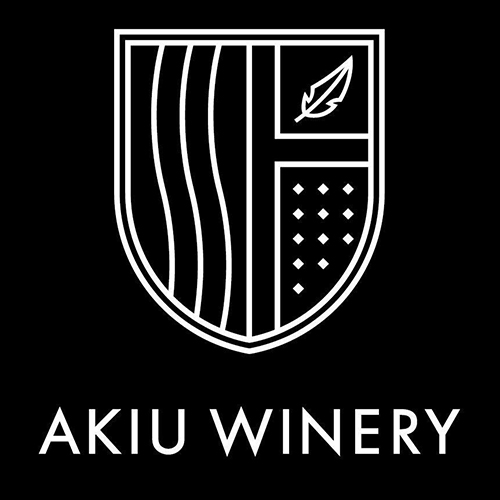There’s absolutely no doubt that Chikafusa Mohri is an idea man who was born to create. Having spent most of his career as an architect responsible for designing hot spring baths and public buildings, however, it might seem a little strange that he’s now making cider and wine as the operator of Akiu Winery in Sendai, the capital of Miyagi Prefecture approximately 300 kilometers north of Tokyo.
That’s why inCiderJapan decided to interview the pioneer behind the company intent on revitalizing an area directly impacted by the Great East Japan Earthquake and tsunamis that devastated the Tohoku region on March 11, 2011. His mission? To eventually create Japan’s very own “Napa”.
Can you tell us a little about yourself? Your background and career?
I was born in Seattle, Washington in 1968 and lived in the United States until I was seven. I studied architecture at university and got a job pretty much straight after graduating; I worked for a general contractor doing design, construction management, and field supervision.
I returned to Sendai in 2003 and worked for an architectural design office until July 2014. During those years, I was in charge of designing buildings in Miyagi, Fukushima, Yamagata, Iwate, and Akita prefectures. But when the Great East Japan Earthquake hit in 2011, I saw much of my own work destroyed, and that compelled me to get involved in disaster relief activities.
As part of the restoration efforts to revive Miyagi Prefecture’s food and produce industries, I established Akiu Winery with financial help from the Mitsubishi Corp. Disaster Relief Foundation and launched the company in December of 2015 (winning that year’s Sendai City Excellence Award at the SENDAI for Startups! Business Grand Prix).
Two years later, a few friends and I, as director, started a tourism and city/town development company called the Akiu Tourism Factory, which collaborates with surrounding areas of Akiu to develop food, nature, and outdoor tourism.
Why establish a winery, and how did making cider enter the picture?
As I said before, my career began at a design office where I oversaw the development of many public facilities and buildings. After 3/11, there were countless requests from local disaster relief groups for our design office to help formulate reconstruction plans. One thing I noticed was the only winery at that time in Miyagi had been wiped away by the tsunami and wine production had been suspended. So one of the ideas we pitched was to build a new winery.
That project, however, was understandably secondary compared to the enormous number of far more urgent issues to address, and the winery idea never became part of the disaster relief plan. But because I personally believed that wine production could help reinstate sales for the ceased market of Miyagi’s specialty products, I decided to build a winery of my own.
Miyagi Prefecture’s volume of grape production ranks 44th in the nation, whereas apples come in ninth, which is considerably high and makes apples a precious raw food material. And although not exactly well-known, high-quality apples are being produced here in Miyagi and almost all of them are consumed within the prefecture.
In fact, Miyagi Prefecture produces more than quite a lot of excellent food. However, due to the problems with Japan’s aging population, our local producers and production yields are decreasing year after year. I figured since I’m working to promote Miyagi’s food industry and desire to train future generations, cider might play a key role. The reason we make cider is so that we can somehow protect Miyagi’s apple business.
How big is the winery?
Our winery and vineyard sit on a total of three hectares next to a forest on lands that used to be farmed for tobacco. In addition to the winery, our facilities include an aging room, laboratory, shop, tasting section, cafe, seminar room, and office that covers a modest 400 square meters.
What varieties of apples do you use for the ciders you make? I would imagine your output to be somewhat low.
We use 100% Miyagi-grown apples, including Fuji, Jonagold, Kogyoku, and Sour Rouge, a sour yet tasteful cultivar which was created in Miyagi Prefecture. At present, we make a dry Brut and a semi-sweet Dolce cider, and yes, as you mentioned, our capacity is only about 3,000L per year.
Have you seen any difference in your sales between 2015 and now?
The progress has been gradual, but we’re happy to say that both production and sales have been increasing. We definitely want to scale up production if the demand is there.
Are there any benefits for the winery being located in Sendai?
We are located in Okuzashiki, about 30 minutes away from Sendai City, which has a population of 1,080,000 people, in a place called “Akiu Onsen Township”, so there are many tourists that visit from in and out of Sendai. We have had some success in promoting our ciders and wines by matching them with locally-grown Miyagi food.
How are you marketing and promoting your ciders? Where can people buy them?
Because our ciders aren’t as well-known as our wines, there is that challenge. So in addition to traditional marketing through pamphlets and fliers, etc., we also hold dinner events and tastings and such. Our ciders can be purchased at the winery and at our website, which together comprises about 60% of our sales. You can also find our ciders at department stores and liquor shops in Sendai City, as well as at most onsen ryokan (traditional Japanese bath-house inns) in Akiu. On top of that, there is a Miyagi antenna shop in Ikebukuro called “Miyagi Furusato (Hometown) Plaza” that carries our products, and we’re currently looking into developing sales channels more aggressively in the metropolitan area.
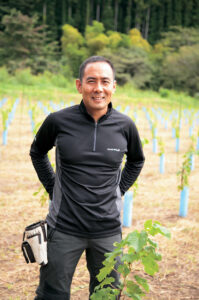
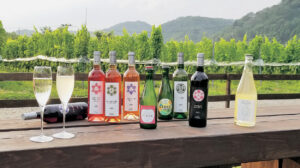
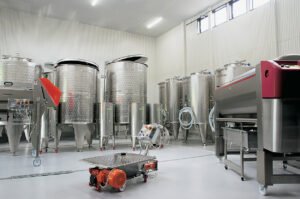
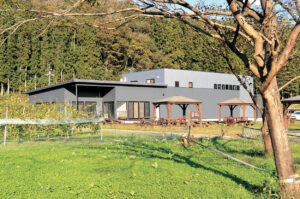
Do you offer winery tours to the public? If so, when is the best time to visit?
We don’t have the kind of tours where one of our staff shows you around, but visitors can easily view the winery/cidery since the walls are made of glass. Our facilities are surrounded by vineyards, so from the end of August until the end of October is the best time for visitors, but the Akiu Onsen Township has a very beautiful satoyama (mountain foothills) view, so you can enjoy that year-round.
If you’re lucky, you can see us prepare our ciders in October and January, and we even recruit volunteers through our Facebook Page to help.
What other things can we expect and be excited about from Akiu Winery?
Keep your ears open for something called the “Kakuda Space Cider Project”. In Kakuda City in Miyagi Prefecture, there is a JAXA Kakuda Space Center and we are working with them with the end goal to increase the area’s tourism. Since there are apples grown in Kakuda City, we want to use them to make cider and ultimately have them delivered to the International Space Station. Nihonshu (sake) and shochu (distilled spirits) have both already been taken to the International Space Station, and I am keen on creating the first marriage of space food and cider, as well as Kakuda’s specialty duck dishes!
What are your aims for Akiu Winery and the near future?
We are working to complete the building of a restaurant by 2020. We want to create a place where people can experience the tastes of Akiu ciders and wines along with Miyagi’s abundant food and produce throughout the four seasons. For example, “Nojiri Buckwheat Noodles” are a special type of soba noodle produced in Akiu. I’d like to make galettes with them!
Do you have any final words for our readers?
Since opening in 2015, I have worked consciously to empower future generations. We currently get support from the prefecture to use Akiu Winery as a training facility so we can work on helping build new wineries. There are a few of us who have studied and trained together, and now there are four wineries in the prefecture, three of them also producing cider.
We also have friends in Minamisanriku-Cho (one of the towns along the coastline hit hard by 3/11) and other nearby areas who are all trying to build wineries and encourage wine tourism. One can guess then that Miyagi wine production is only going to continue to increase and become even more exciting, especially since many other wineries are starting to make cider, too!
So if I could say one last thing, it’d be to please support Miyagi Prefecture and our efforts!
AKIU WINERY
HOURS OF OPERATION:
Mondays through Sundays (except Tuesdays): 9:30〜17:00
Tuesdays: Closed
ADDRESS:
〒982-0241 Miyagi, Sendai, Taihaku, Akiumachi Yumoto, Biwaharanishi 6
TEL: 0222-26-7475
https://akiuwinery.co.jp/

